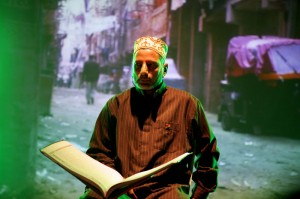Radio Muezzin | Sydney Festival & Seymour Centre & Rimini Protokoll
- January 19th, 2012
- Posted in Reviews & Responses
- Write comment

As the Sydney Festival explodes with various opening nights and outdoor events – like well-considered fireworks – there has been the usual buzz and hum of opinions colliding and clashing in print, in cafes, in foyers, in parks and online.
Included in the glamorous line up is Radio Muezzin a show which has been touring since its creation in 2008 – and subsequent premiere in Berlin in 2009 directed by Stefan Kaegi of Rimini Protokoll.
As their website states “Rimini Protokoll are recognized as being among the leaders and creators of the theatre movement known as “Reality Trend” (Theater der Zeit),” a style of documentary theatre which has in intense and exhaustive research and development period.
Red carpet. Ceiling fans hang overhead. A wall of white screens. Four chairs. A small table with a sound system. A wicker screen. A shoe rack. Three voices in the dark.
As the light grows we see a man, leaning on a crutch singing. Behind us another man is calling. Soon a third joins in.
In Cairo, the Muezzins lead the call to prayer for tens of thousands of people. In Sydney, we sit observing the humble lives of these men who are armed with grand history and tradition and strong voices. As the world turns, technologies develop and throughout this piece we see the impact of this new technology as the need for Muezzins are being diminished by radio and loud speaker technologies.
Part scrap book and part family slide show, we are introduced to three Muezzins – their background, personal history, their work, their homeland, their religion, their traditions. But of the chairs on stage, one is left strangely absent. It is then explained that this Muezzin, due to irreconcilable differences with the others, is no longer in the show. Instead a young man reads his contribution – one that speaks to the change in Cairo, the change of focus in priorities, symbolising the greater conflicts within Cairo with absence.
It is a curious experience – to see this long-standing traveling show about Muslim practice performed by actual Muezzins, not actors. They tell their stories in their own language and we sit reading the translated surtitles. The curiosity of this experience is amplified by the bumbling, fumbling and shuffling of the Muezzins – they are not trained actors – this is not artifice – they are everyday people transplanted onto stage, in a city far from their homes, performing in a context which appears so different from their homeland.
It is this which I find so strange.
The show itself is a portrait of anxiety – of losing tradition and culture in the face of technological and economic advancement. Yet the very same technologies are employed in the show. This collision creates an interesting friction and a line of questioning about the value of tradition, the value of culture in an ever expanding and accessible technologised world.
There is something very awkward about the show. And for some that may be charming. I found it awkward – but perhaps that’s a part of the “Reality Trend” flavour? Perhaps it is designed to ensure that the natural, normal presenter doesn’t become a hyper-performative, inauthentic representation of themselves. Perhaps.
Regardless, Radio Muezzin has left me feeling unsettled and I will continue to think about it beyond today as I continue to wonder if the fourth muezzin has got his own YouTube channel yet?